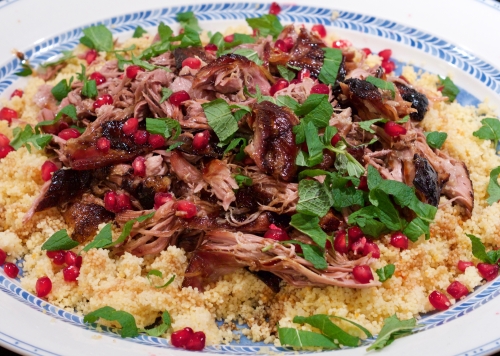
This makes such a lovely weekend dish and looks really attractive served on a large platter in the middle of the table. It requires a few hours in the oven but is hardly any work at all and uses just a few ingredients.
Wine Suggestion: this dish cries out for a Moorish influenced wine and nothing quite achieves this more than a Spanish Tempranillo. Our choice of the evening was the Carmelo Rodero Ribera del Duero Crianza which is juicy, powerful and also manages to achieve a perfumed elegance with exotic eastern spice hints.
Pomegranate & slow cooked lamb couscous – serves 6
- 2kg lamb shoulder (or get your butcher to give you a forequarter if the lambs are small)
- 1 onion, sliced
- 1 tbsp pomegranate molasses, plus extra to serve
- 300g couscous
- butter
- 1 tsp harissa
- a small bunch of mint, leaves roughly chopped
- seeds from 1 pomegranate
Heat the oven to 190C/fan 170C/gas 5.
Put the lamb into a roasting tin with the fatty side facing up. Scatter the onion around the lamb. Score the lamb with a sharp knife and rub in the pomegranate molasses with your hands. Season well. Add 2 mugs of water to the tin, then cover with foil and roast for 4 hours. Rest for 15 minutes before pulling chunks of the lamb off the bone with 2 forks.
While the lamb is resting, put the couscous into a large bowl with a large knob of butter, the harissa and seasoning, then add enough boiling water to just cover. Cover the bowl with cling film and leave for 5 minutes before fluffing the grains gently with a fork. Put the couscous onto a platter and arrange the shredded lamb on top. Pour off any fat from the roasting tin and pour the juices over the lamb and couscous plus a little more molasses. Scatter with the mint and pomegranate seeds.
(Original recipe by Lulu Grimes IN: BBC Olive Magazine, February 2014.)



 How to make friends and influence people – serve them roast beef! We love it rare.
How to make friends and influence people – serve them roast beef! We love it rare.